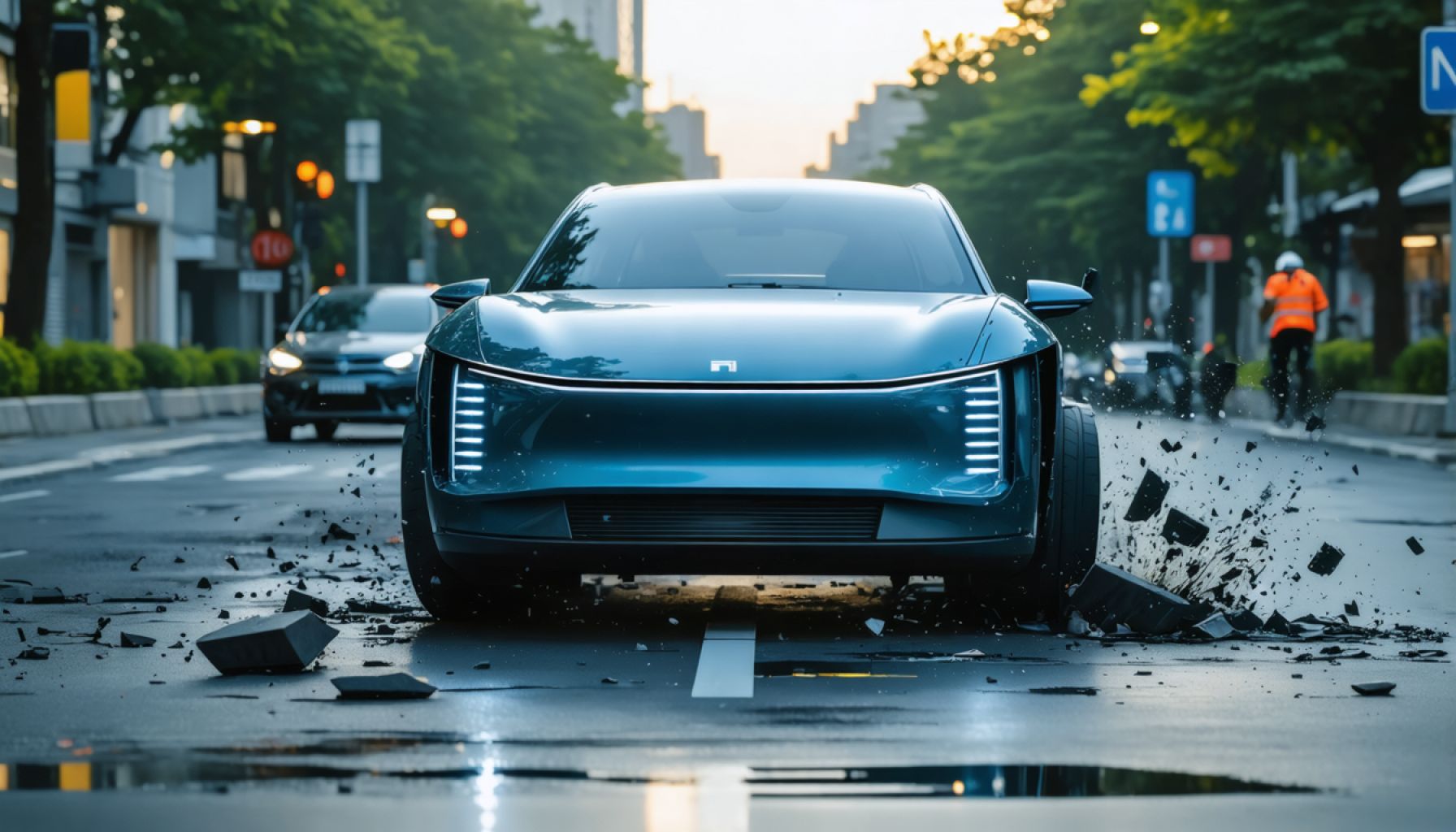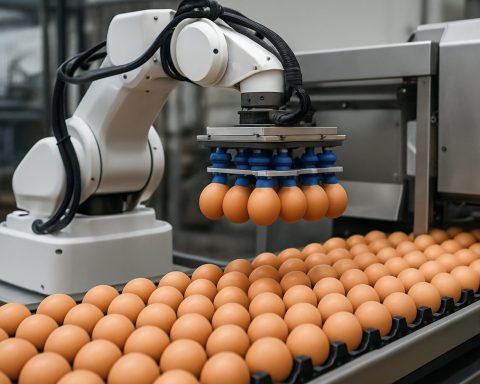- Xiaomi enters the transportation sector, expanding from its roots in consumer electronics to electric vehicles (EVs).
- A recent crash involving a Xiaomi EV on a Chinese expressway raises safety concerns about emerging smart driving technologies.
- The incident prompts a critical evaluation of current autonomous driving systems’ readiness and safety.
- Critics call for more stringent testing and regulatory standards, comparing the need for scrutiny to that of aviation technology.
- Xiaomi faces strategic challenges as ongoing investigations influence its reputation and future direction.
- The event highlights the importance of balancing innovation with safety in the pursuit of autonomous vehicle technology.
- The necessity to forge consumer trust is emphasized as crucial to the industry’s progress.
The sleek rebel of the consumer electronics world, Xiaomi, is making waves in the realm of transportation. However, a recent crash involving one of its new electric vehicles (EVs) on a busy Chinese expressway has cast a shadow over its ambitions. The incident—one of the first publicized accidents involving Xiaomi’s entry into the auto sector—has prompted a heated dialogue on the capabilities and safety of emergent smart driving technologies.
In the heart of China’s urban sprawl, where lush green parks contrast sharply with a skyline of steel and glass, this accident is more than a mere traffic mishap. It’s a wake-up call, echoing across boardrooms from Beijing to Silicon Valley. The crash, causing injuries and an uproar, has turned a spotlight on autonomous driving technology—a field both lauded for its potential and scrutinized for its risks.
As the industry rushes toward an era where cars drive themselves, confidence in these systems is paramount. Yet, this incident has sown seeds of doubt, urging a reexamination of whether the software that pilots these vehicles is truly road-ready. Critics argue that stringent testing and robust regulations are non-negotiable prerequisites, demanding a rigor that’s currently lacking. They advocate for a standardization of safety checks akin to the rigorous scrutiny aviation technology undergoes.
For Xiaomi, a name synonymous with cutting-edge smartphones and smart homes, the transition to automobiles was seen as a bold leap. However, amid the swirl of excitement, this accident might force a strategic pause. The company now finds itself at a crossroads as industry stakeholders and consumers alike await the findings of ongoing investigations. The Xi tech giant’s next moves could redefine consumer trust, influencing not only its trajectory but setting precedents for others vying for a slice of the automotive pie.
This event underscores an essential truth: as we edge closer to a world intertwined with AI—a world where our very streets may soon brim with vehicles driven by algorithms—the call for innovation must always be shadowed by an unwavering commitment to safety. For Xiaomi and its peers, ensuring this balance is not just a regulatory challenge; it’s a moral imperative.
As the dust settles, the message is clear. In the relentless pursuit of the autonomous driving revolution, the quest must be to forge trust as much as technology. In the end, the journey is every bit as crucial as the destination.
Is Xiaomi Facing Its Biggest Challenge Yet in the Autonomous Vehicle Market?
Xiaomi’s recent foray into the electric vehicle (EV) market has put the spotlight on autonomous driving technology. However, a recent crash involving one of Xiaomi’s EVs has raised critical questions about the safety and readiness of these vehicles. The incident on a busy Chinese expressway serves as a stark reminder of the challenges facing smart driving technologies. As such, it prompts an urgent examination of the safety measures in place and their adequacy in preventing similar events in the future.
Insights & Predictions
– Autonomous Vehicle Safety: The crash highlights the need for more robust autonomous vehicle testing and safety protocols. As this technology matures, industry stakeholders are likely to push for standardization similar to what is seen in the aviation industry.
– Market Potential: Despite safety concerns, the global autonomous vehicle market is expected to grow exponentially. According to a report by Allied Market Research, the market is projected to reach $556.67 billion by 2026, growing at a CAGR of 39.47% from 2019 to 2026. This underscores a promising potential for manufacturers who can successfully address safety issues.
Real-World Use Cases
For Xiaomi and others in the field, leveraging real-world scenarios for testing can provide critical data needed for refining autonomous systems. Companies should focus on expansive and diverse testing environments that mimic real-world conditions to better prepare vehicles for actual roadways.
Features, Specs & Pricing
– Xiaomi EV Features: Speculation around Xiaomi’s EVs suggests they incorporate cutting-edge AI for auto-navigation, advanced sensor arrays for terrain mapping, and robust in-car communication systems. While official specs remain under wraps, these features indicate a strong focus on integrating smart technology.
– Pricing Strategy: While pricing details for Xiaomi’s EVs are currently sparse, the company’s history suggests a competitively priced entry-level strategy aimed at maximizing accessibility and market penetration.
Pros & Cons Overview
Pros:
– Advanced technology integration, leveraging Xiaomi’s expertise in consumer electronics.
– Potentially competitive pricing strategy in line with Xiaomi’s history of cost-effective products.
Cons:
– Current safety concerns requiring resolution to build consumer trust.
– High competitive pressure from established automakers with more extensive automotive experience.
Controversies & Limitations
The primary controversy stems from safety concerns surrounding autonomous systems. Critiques point to the need for stringent regulations and comprehensive safety tests. Additionally, Xiaomi’s limited experience in traditional automaking poses challenges in building brand trust amongst consumers accustomed to long-standing automotive brands.
Actionable Recommendations
1. Prioritize Safety: Xiaomi and emerging players must intensify safety testing, emulating aviation industry standards.
2. Strengthen Communication: Clear, transparent updates on safety improvements can help rebuild consumer trust.
3. Enhance Collaboration: Forming partnerships with experienced auto manufacturers might provide valuable insights and bolster vehicle reliability.
For more insights into consumer electronics and emerging technology trends, visit Xiaomi’s official site.
In conclusion, while Xiaomi navigates the early challenges in its automotive venture, the focus must remain unwavering on balancing innovation with safety. The successful adoption of autonomous tech hinges on the trust earned through relentless diligence and comprehensive testing.







